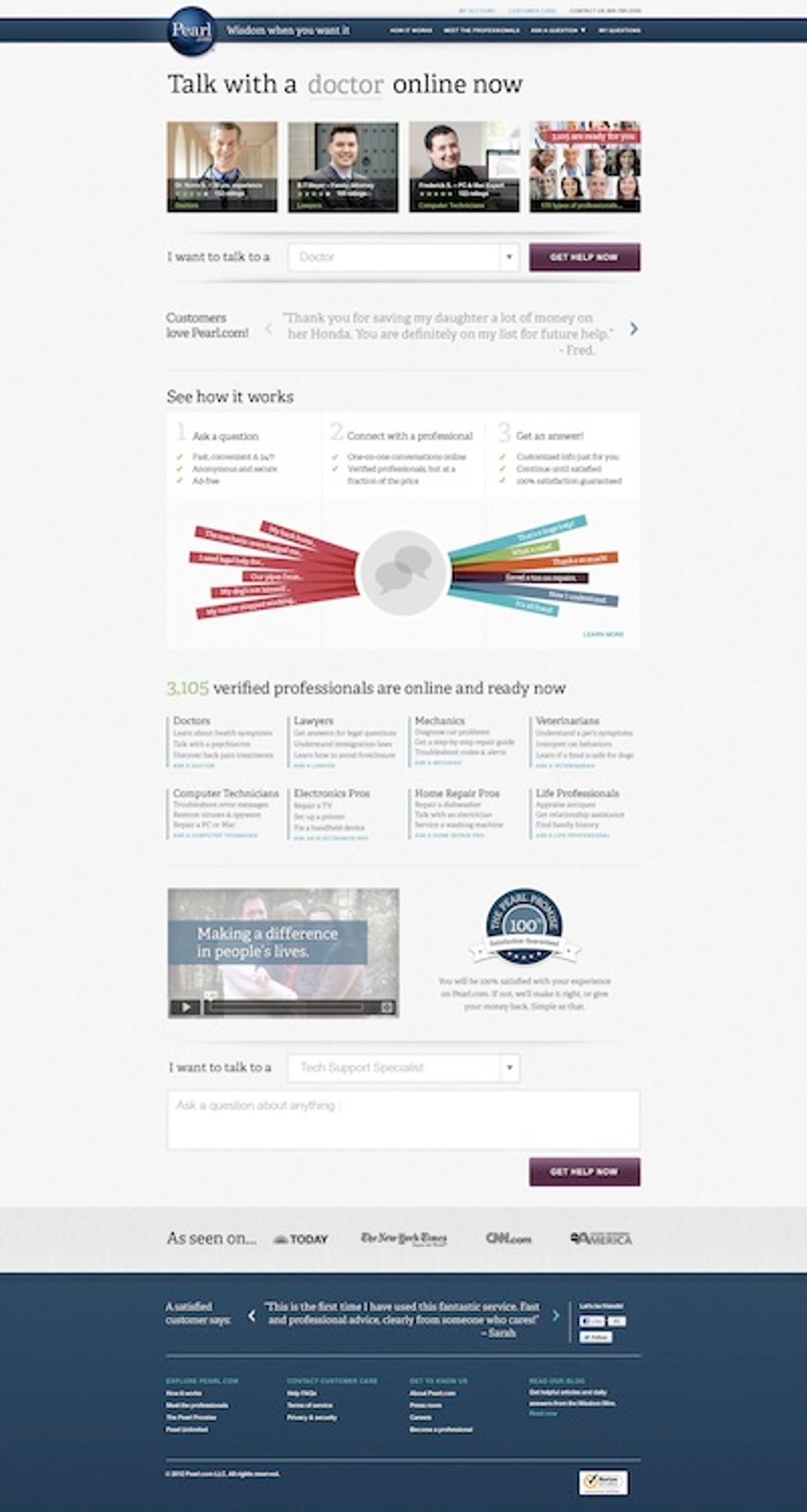Startup companies divide broadly into two groups: Those that want to generate a lot of buzz, and those that don’t want to generate any buzz at all.
The latter usually are trying to remain in “stealth” while they build a prototype for a product or service that might otherwise be easily copied by a competitor.
But the Presidio-based Pearl.com, headed by CEO Andy Kurtzig, has been methodically going about its business for eight years now, very much below the radar, so much so we cannot even consider it a startup any longer.
And what is its business?
Pearl.com, which has just rebranded from Just Answer, which earlier was rebranded from Expert Ask, quickly and inexpensively delivers “pearls of wisdom” from professionals like doctors, lawyers, accountants, mechanics, appliance repair people, IT support and so on whenever you need it.
They have certified some 10,000 professionals in 700 different specialties and the service operates in 196 countries. Today their average response time in handling about 250,000 questions per month is 7.5 seconds, and the average cost to you, the consumer, is about $30.
(Certain professionals earn more – lawyers may charge $60-70 for an answer -- and some less.)
Popular experts have thousands of positive ratings from other users.
“We get lumped with different answer sites like Quora and Yahoo Answers, but we are very different,” says Kurtzig, “because we have real experts who can help real people. Whether they can afford health insurance or not, or can afford a lawyer or not, live in a small town or it’s 4 a.m., people have problems and we can help.”
The company has an eight-step process for rating the ongoing quality of its experts, and if they don’t meet the test, they cannot continue being listed at the site.
“We’re constantly vetting these experts,” says Kurtzig. Based on the data, it’s harder to become an expert on our site than it is to get into Harvard.”
For those who do pass the test, answering users’ questions at Pearl.com has become quite lucrative.
“Experts make as much as $40,000 a month,” Kurtzig says. “The professional services sector is huge. It’s 2.5 times as large as the consumer market, where Amazon and Apple are playing.”
The company recently redesigned its service “from the ground up” and now offers a live chat feature, much like Facebook Chat, so users and experts can interact beyond just asking and answering one specific question.
The typical dialogue, or answering process if you will, requires about an hour of the expert’s time and expertise, but is so much more efficient than an office visit that the cost can be kept relatively low.
Pearl’s database of experts has attracted many of the popular “free” answer sites in as partners. “Pet MD, CarTalk, Doctor Phil, Answers.com all partner with us so they can provide answers to more questions than they could do on their own. Otherwise, a huge proportion of their questions would go unanswered” Kurtzig explains.
Those sites typically are ad-supported, of course, with a completely different business model from Pearl’s.
Kurtzig has noticed a number of interesting patterns in the company’s data around professional services. “One surprise is the importance of antique appraisals. People find things in their grandmother’s garage that have been sitting around for years they don’t know what to do with. Now they can post photos, and easily get advice. That is now 2.5 percent of our business!”
Another comes from overseas – the country with the most mental health questions is, far and away, Japan. Mental health issues are still hushed up and considered inappropriate to talk about openly in that culture; therefore there are relatively few mental health professionals practicing there.
“Our mission is to help people everywhere by building the number one platform for professional services in the world,” says Kurtzig. We want to improve the world and improve people’s lives.
“We’re also excited to be helping bring the professionals services sector online. We think the opportunity is huge because only about one percent of them are online so far.”
This global platform started out, as so many entrepreneurial ventures do, on a very personal level. Kurtzig’s wife was expecting their first child and she was peppering her obstetrician with so many questions the doctor told her to save them until her next appointment.
“She wasn’t having that,” Kurtzig recalls. “So I said I think I may be able to do something about this…”





















